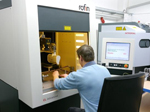5 September 2013
In-House Laser Material Processing A Smart Business Decision for DHF
 DHF Precision Mechanics GmbH managing directors, Bernhard Fischbacher, Tobias Telser and Paul Heilmann, were visiting a trade fair to catch up on laser marking systems when the staff at ROFIN made an unusual offer. The trio were invited to take a seat in front of a ROFIN Performance manual laser welding system and actually weld some parts; an experience, which led the three DHF managers to re-think their investment agenda.
DHF Precision Mechanics GmbH managing directors, Bernhard Fischbacher, Tobias Telser and Paul Heilmann, were visiting a trade fair to catch up on laser marking systems when the staff at ROFIN made an unusual offer. The trio were invited to take a seat in front of a ROFIN Performance manual laser welding system and actually weld some parts; an experience, which led the three DHF managers to re-think their investment agenda.
Based in Ostermünchen near Munich, DHF Precision Mechanics counts well-known medical device, electronics and aerospace engineering companies amongst its customers. The company specialises in high-precision CNC-milled parts and assemblies. Following 15 years of virtually continuous growth, the company now operates 18 CNC machining centers and offers a service portfolio ranging from prototype manufacturing to bulk production of several 10.000 parts/year.
With fine precision plus a fast and flexible response to customer requirements, DHF has established an enviable reputation in the market. The company regularly push the technical limits of CNC machining, such as the production of parts for electrical motors, which must be produced to micron tolerances.
DHF has built up a comprehensive range of in-house capabilities including: CAD/CAM design, machining various steel, titanium and aluminum alloys, CNC -milling, surface finishing, assembly and quality assurance. This allows the company to meet their key objective of quick response to customers’ individual requirements.
The production processes at DHF frequently comprise of welding, engraving and marking. Welded components, especially those for medical device manufacturers, must be perfect, not only free from porosity and cracks, but the surface finish must also be immaculate to eliminate any chance of bacterial contamination. These criteria also apply to deep engravings and markings. Contours must be free from burrs and grooves. In addition, the marking process must not induce any material changes that might promote surface corrosive action.
Until 2012, DHF had been outsourcing all laser material processing tasks. Outsourcing however, not only significantly reduced production flexibility and speed for certain parts, but also increased the complexity of logistics. Furthermore, the annual outsourcing business volume had been approaching the six-digit range; reason enough in itself to consider establishing an in-house laser material processing center.
Being new to laser technology, Fischbacher, Telser and Heilmann initially focused on laser marking, as they expect laser welding to be much more difficult to control - at least up to the point where they experienced laser welding first hand.
- Contact Information
- Name: Andy May
- Email: a.may@rofin-baasel.co.uk
- Website: www.rofin.co.uk

